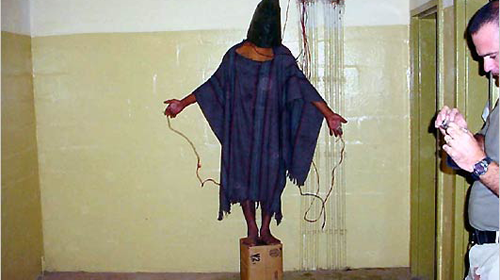Fact Sheet: Legal Claims in Ali et al., v. Rumsfeld
The ACLU and Human Rights First are asking a federal district court in Illinois to rule that Secretary of Defense Donald Rumsfeld violated the U.S. Constitution and international laws prohibiting torture and cruel, inhuman or degrading treatment or punishment.
In their complaint, the ACLU and Human Rights First charge that Secretary Rumsfeld
> Knew that torture and abuse were taking place and did nothing to stop it. Through his actions and failures to act, Secretary Rumsfeld expressly and tacitly authorized his subordinates’ unlawful conduct and failed to stop the abuse after he knew of it.
> Along with his subordinates, Secretary Rumsfeld authorized, ratified and failed to stop the unlawful treatment of detainees in U.S. custody. Secretary Rumsfeld had the power to formulate policies relating to the treatment and interrogation of detainees in Iraq and Afghanistan, was directly and personally involved in setting interrogation rules, and exercised his power to allow illegal practices, namely, the torture or other cruel, inhuman or degrading treatment of detainees in U.S. custody.
> Exercised effective command over individuals who intentionally and knowingly subjected detainees to cruel, inhuman or degrading treatment.
> Knew that his subordinates were torturing detainees in U.S. custody and violated his duty as a commander to punish the perpetrators or otherwise to prevent further acts of torture.
Legal Basis for Claims
Violation of Fifth Amendment Due Process Clause. The Fifth Amendment’s Due Process Clause prohibits any person acting under color of U.S. law from engaging in or allowing torture, abuse or other treatment that “shocks the conscience.”
Violation of Fifth and Eighth Amendment Prohibitions on Cruel and Unusual Punishment. The Fifth and Eighth Amendments to the U.S. Constitution prohibit any person acting under color of U.S. law from engaging in or allowing torture; or other cruel, inhuman or degrading treatment or punishment; or any other treatment that constitutes deprivation of basic human needs, such as food and reasonable safety, and the unnecessary and wanton infliction of pain on any person in U.S. custody or control.
Torture and Cruel, Inhuman or Degrading Treatment in Violation of the Law of Nations. Every civilized country in the world recognizes fundamental human rights principles, including the prohibition against torture. These core principles are known as the “law of nations,” and they are embodied in many documents that the United States has signed and ratified, including the United Nations Convention Against Torture or Other Cruel, Inhuman or Degrading Treatment or Punishment (Dec. 10, 1984). The prohibition against torture is a “specific, universal, and obligatory” norm, from which no derogation is allowed.
Command Responsibility. The law of nations also imposes liability on commanding officers for the acts of their subordinates. A commanding officer is liable for the acts of his subordinates if the commanding officer knows of a substantial likelihood that torture or other cruel, inhuman or degrading treatment will result from the execution of an order from the commander. This doctrine of “command responsibility” has been recognized by the U.S. Supreme Court since In re Yamashita, 327 U.S. 1 (1946), a post-World War II case in which a Japanese general was convicted for abuses by his troops.
Violation of the Geneva Conventions. The Third and Fourth Geneva Conventions, including Article 3 (relative to the Treatment of Prisoners of War) specifically prohibit the torture and other cruel, inhuman or degrading treatment of detainees in U.S. custody. The United States has signed and ratified these Conventions, and failure to adhere to these provisions constitutes a direct and enforceable treaty violation as well as a violation of the law of nations.
Stay Informed
Sign up to be the first to hear about how to take action.




